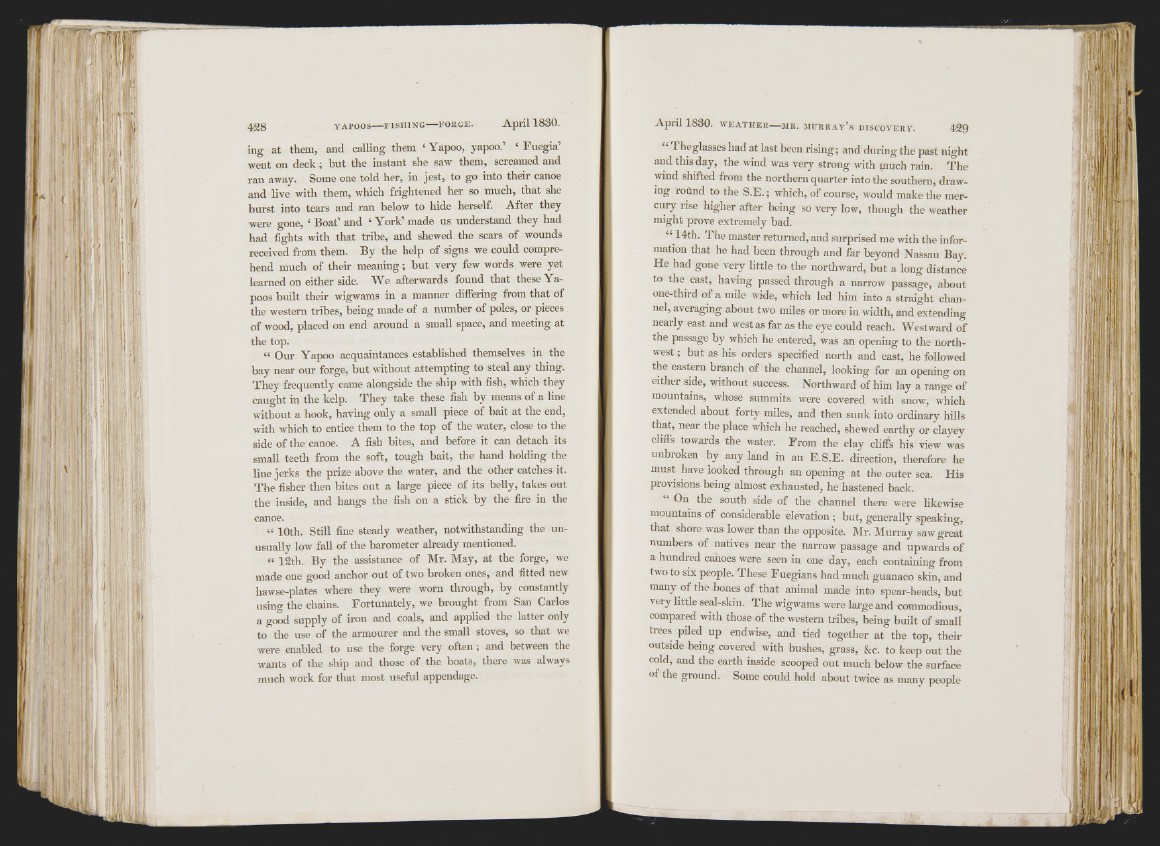
lif t
’ f
"iI to ‘
'•i , ÜÍIÜ ,
I i ' '11)1
- ' r' J f *
a l t o f i
11 ‘
■ [fl
ing at them, and calling them ‘ Yapoo, yapoo.’ ‘ Fuegia’
went on deck; but the instant she saw them, screamed and
ran away. Some one told her, in jest, to go into their canoe
and live with them, which frightened her so much, that she
burst into tears and ran below to hide herself. After they
were gone, ‘ Boat’ and ‘ York’ made us understand they had
had fights with that tribe, and shewed the scars of wounds
received from them. By the help of signs we could comprehend
much of their meaning; but very few words were yet
learned on either side. AVe afterwards found that these Yapoos
built their wigwams in a manner difiering from that of
the western tribes, being made of a number of poles, or pieces
of wood, placed on end around a small space, and meeting at
the top.
“ Our Yapoo acquaintances established themselves in the
bay near our forge, but without attempting to steal any thing.
They frequently came alongside the ship with fish, which they
caught in the kelp. They take these fish by means of a line
without a hook, having only a small piece of bait at the end,
with which to entice them to the top of the water, close to the
side of the canoe. A fish bites, and before it can detach its
small teeth from the soft, tough bait, the hand holding the
line jerks the prize above the water, and the other catches it.
The fisher then bites out a large piece of its belly, takes out
the inside, and hangs the fish on a stick by the fire in the
canoe.
“ 10th. Still fine steady weather, notwithstanding the unusually
low fall of the barometer already mentioned.
“ 12th. By the assistance of Mr. May, at the forge, we
made one good anchor out of two broken ones, and fitted new
hawse-plates where they were worn through, by constantly
using the chains. Fortunately, we brought from San Carlos
a good supply of iron and coals, and applied the latter only
to the use of the armourer and the small stoves, so that we
were enabled to use the forge very often; and between the
wants of the ship and those of the boats, there was always
much work for that most useful appendage.
“ Theglasses had at last been rising; and during the past night
and this day, the wind was very strong with much rain. The
wind shifted from the northern quarter into the southern, drawing
round to the S .F .; which, of course, would make the mercury
rise higher after being so very low, though the weather
might prove extremely bad.
“ 14th. The master returned, and surprised me with the information
that he had been through and far beyond Nassau Bay.
He had gone very little to the northward, but a long distance
to the east, having passed through a narrow passage, about
one-third of a mile wide, which led him into a straight channel,
averaging about two miles or more in width, and extending
nearly east and west as far as the eye could reach. AVestward of
the passage by which he entered, was an opening to the northwest
; but as his orders specified north and east, he followed
the eastern branch of the channel, looking for an opening on
either side, without success. Northward of him lay a range of
mountains, whose summits were covered with snow, which
extended about forty miles, and then sunk into ordinary hills
that, near the place which he reached, shewed earthy or clayey
cliifs towards the water. From the clay cliffs his view was
unbroken by any land in an E.S.E. direction, therefore he
must have looked through an opening at the outer sea. His
provisions being almost exhausted, he hastened back.
“ On the south side of the channel there were likewise
mountains of considerable elevation ; but, generally speaking,
that shore was lower than the opposite, Mr. Murray saw great
numbers of natives near the narrow passage and upwards of
a hundred canoes were seen in one day, each containing from
two to six people. These Fuegians had much guanaco skin, and
many of the bones of that animal made into spear-heads, but
very little seal-skin. The wigwams were large and commodious,
compared with those of the western tribes, being built of small
trees piled up endwise, and tied together at the top, their
outside being covered with bushes, grass, &c. to keep out the
cold, and the earth inside scooped out much below the surface
of the ground. Some could hold about twice as many people
I